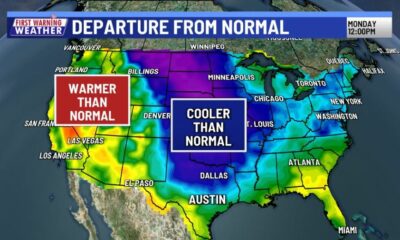Mississippi Today
Medicaid expansion: What are its chances in 2025?


Arguably the biggest issue of the 2024 legislative session, Medicaid expansion is likely to come up again next year. But did the historic 2024 session create the momentum needed for it to cross the finish line in 2025, or was it merely a one-off?
The two most influential lawmakers for this issue in the Senate, Lt. Gov. Delbert Hosemann, who oversees the Senate, and Senate Medicaid Chair Kevin Blackwell, both told Mississippi Today they would not consider an expansion plan that didn’t include a work requirement.
Hosemann, who said he was disappointed with the way expansion died last year, confirmed in an emailed statement that he would push for an expansion bill next session as long as it had a work requirement in it. Blackwell declined to comment whether he would push the issue next year.
A work requirement is more likely to be approved by the federal government this year than last, since President-elect Donald Trump will be in office and approved work requirements in his last term.
Still, the Trump administration only ever approved work requirements in states that had expansion – as a means of limiting it – and never in states seeking to expand Medicaid for the first time. That means the Senate is banking on the president making an unprecedented move for Mississippi.
Including a work requirement is a political tactic meant to make expansion more palatable to a Republican majority Legislature led by a governor who has been vehemently opposed to expansion for years, derisively calling it “Obamacare” and “welfare” on social media.
The bureaucracy of requiring monthly or semi-annual proof of employment ends up being another stressor on low-income people already facing a slew of socioeconomic barriers – as well as a stressor on the state Medicaid system, some experts say.
Currently, Georgia is the only expanded state with a work requirement, and it remains in litigation with the federal government over the issue. The plan has only covered 4,300 people – despite lawmakers predicting 345,000 people would be eligible – and cost taxpayers $26 million as of last March. More than 90% of that went toward administrative costs.
“Georgia’s plan has proven to be very profitable for large companies like Deloitte (the primary consultant for Georgia’s project) but has provided health care to almost no one who needs it,” said Joan Alker, Medicaid expert and executive director of Georgetown University’s Center for Children and Families. “It’s been a terrible waste of taxpayer dollars so far.”
Meanwhile, Hosemann and Blackwell’s counterparts in the House chose not to speak to Mississippi Today on the details of the issue ahead of the session, despite being the main drivers of last year’s expansion bill – the first expansion bill authored by Republicans in the history of the Mississippi Legislature, and which garnered more support than any other expansion bill in the last decade.
Speaker of the House Jason White did not respond to Mississippi Today’s questions about his plans for the session.
White told business leaders at the Mississippi Economic Council’s annual Hobnob event that he would make Medicaid expansion a 2025 legislative priority.
“We trust our elected officials and state agencies to use federal dollars responsibly to invest in critical infrastructure, promote education and workforce training and maintain a balanced regulatory framework that all promote economic development,” White said. “Let’s give our hospitals and health care experts the same opportunity, so that hardworking, low-income Mississippians will benefit.”
House Medicaid Chairwoman Missy McGee told Mississippi Today that it will be a priority for the House Medicaid Committee.
The 2024 House expansion bill included a provision that if federal authorities did not approve the waiver necessary to allow a Mississippi work requirement by a certain deadline, Medicaid would still be fully expanded to people up to 138% of the federal poverty level – about $20,000 for an individual or $43,000 for a family of four. Ultimately, the Senate scratched that provision in conference, and also lowered the income threshold to 99% of the federal poverty level – about $15,000 for an individual or $31,000 for a family of four. The Senate’s plan isn’t considered traditional expansion and wouldn’t qualify for the increased federal match that makes expansion a prudent economic policy for states.
Since the Affordable Care Act made it possible in 2014, states have had the option to expand Medicaid to cover the working poor. Mississippi is one of only 10 states not to do so.
Tens of thousands of working Mississippians go without health coverage each year, making too little to afford the high deductibles on the cheapest marketplace insurance plan but too much to qualify for Medicaid under the current stipulations.
Medicaid eligibility varies from state to state, and Mississippi has one of the strictest income requirements in the nation. Childless adults don’t qualify, and parents must make less than 28% of the federal poverty level, a mere $7,000 annually for a family of three, to qualify. More times than not, that means that working a full-time job counts against an individual – despite anti-expansion critics arguing that Medicaid should only apply to those who work.
Expanding Medicaid would cover adults – including those without children – who make up to 138% of the federal poverty level.
But it would also alleviate an enormous burden that Mississippi hospitals currently shoulder: uncompensated care costs.
Without health insurance, many Mississippians are forced to let their health conditions deteriorate. That, in conjunction with the fact that the emergency room is the only place health care providers can’t turn patients away for not having money, means that some Mississippians use the emergency room as their only source of primary care.
The emergency room is also the most expensive place to receive care. When patients can’t pay, hospitals pick up the slack covering their care, and the practice – called uncompensated care – costs hospitals millions.
That’s why Mississippi Hospital Association’s CEO, Richard Roberson, is again asking the Legislature to consider expansion.
“The upside for hospitals could be several hundred million dollars,” he said. “Right now, the hospitals continue to see the patients that don’t have any form of insurance, which is financially harmful for hospitals because they’re having to provide that care for which they’re not being paid. But probably the bigger and most important part of that is you’re having people that are showing up in the hospitals for what really amounts to primary care services – and that’s not what hospitals are for.”
Without expansion, he said, it’s “very possible” more rural hospitals will be forced to shut down in the coming years.
Right now, they’re being kept afloat by enhanced Medicaid payments Gov. Tate Reeves passed in the eleventh-hour of his heated 2023 reelection campaign. But Roberson said there’s no guarantee those payments will continue, which makes it hard for hospitals to plan services and staff.
“We don’t want to rely on a program that’s a one-year program, because that enhanced payment, we’ve got to ask for it every single year,” he said. “And so, as hospitals try to plan for the services they’re going to provide, or as they’re trying to recruit physicians and other staff members, you know you’ve got this for one year … but there are no guarantees.”
Roberson says he’s hopeful going into 2025, given how far expansion got last session.
“I’m more hopeful than I have been, because we now know what a starting place is – for both the Senate and the House. We now know from that conference report what a meeting of the minds was seven months ago. So, that makes me hopeful that whatever concerns still remain, it’s a shorter path to get to those. We’re not starting from scratch.”
But because many Republicans still oppose expansion, any expansion bill in 2025 will likely need the help of the minority party to achieve a veto-proof majority. Last year, Democrats came under fire for blocking a Medicaid expansion compromise in the final days of the session – despite pushing expansion bills for years to no avail – because they felt that the compromise Republican leaders reached wasn’t expansion at all.
Getting both chambers and both parties to agree could prove difficult again this year.
This article first appeared on Mississippi Today and is republished here under a Creative Commons license.![]()
Mississippi Today
Biden travels to New Orleans following the French Quarter attack that killed 14 and injured 30

WASHINGTON (AP) — President Joe Biden is taking a message to the grieving families of victims in the deadly New Year’s attack in New Orleans: “It takes time. You got to hang on.”
Biden on Monday will visit the city where an Army veteran drove a truck into revelers in the French Quarter, killing 14 and injuring 30 more. It’s likely to be the last time Biden travels to the scene of a horrific crime as president to console families of victims. He has less than two weeks left in office.
It’s a grim task that presidents perform, though not every leader has embraced the role with such intimacy as the 82-year-old Biden, who has experienced a lot of personal tragedy in his own life. His first wife and baby daughter died in a car accident in the early 1970s, and his eldest son, Beau, died of cancer in 2015.
“I’ve been there. There’s nothing you can really say to somebody that’s just had such a tragic loss,” Biden told reporters Sunday in a preview of his visit. “My message is going to be personal if I get to get them alone.”
Biden often takes the opportunity at such bleak occasions to speak behind closed doors with the families, offer up his personal phone number in case people want to talk later on and talk about grief in stark, personal terms.
The Democratic president will continue on to California following his stop in New Orleans. The White House was moving forward with plans for the trip even as a snowstorm was hitting the Washington region.
In New Orleans, the driver plowed into a crowd on the city’s famous Bourbon Street. Fourteen revelers were killed along with the driver. Shamsud-Din Jabbar, who steered his speeding truck around a barricade and plowed into the crowd, later was fatally shot in a firefight with police.
Jabbar, an American citizen from Texas, had posted five videos on his Facebook account in the hours before the attack in which he proclaimed his support for the Islamic State militant group and previewed the violence that he would soon unleash in the French Quarter.
Biden on Sunday pushed back against conspiracy theories surrounding the attack, and he urged New Orleans residents to ignore them.
“I spent literally 17, 18 hours with the intelligence community from the time this happened to establish exactly what happened, to establish beyond any reasonable doubt that New Orleans was the act of a single man who acted alone,” he said. “All this talk about conspiracies with other people, there’s not evidence of that — zero.”
The youngest victim was 18 years old, and the oldest was 63. Most victims were in their 20s. They came from Alabama, Louisiana, Mississippi, New York, New Jersey and Great Britain.
Louisiana Sen. Bill Cassidy, a Republican, was asked on Fox News Channel what the city was hoping for from Biden’s visit.
“How can we not feel for both the families of those who die but also those who’ve been injured in their families?” he asked.
“The best thing that the city, the state, and the federal government can do is do their best to make sure that this does not happen again. And what we can do as a people is to make sure that we don’t live our lives in fear or in terror — but live our lives bravely and with liberty, and then support those families however they need support.”
Associated Press writer Fatima Hussein contributed to this report.
This article first appeared on Mississippi Today and is republished here under a Creative Commons license.![]()
Mississippi Today
On this day in 2021


Jan. 6, 2021

Amanda Gorman was trying to finish her poem on national unity when scenes burst upon the television of insurrectionists attacking the U.S. Capitol.
The 22-year-old stayed up late, writing new lines into the night. Two weeks later, she became the youngest inaugural poet in U.S. history, joining a prestigious group that included Maya Angelou and Robert Frost. But few faced as difficult a task, searching for unity amid violence, a deadly pandemic and polarizing partisanship.
She described herself as a “skinny Black girl, descended from slaves and raised by a single mother” who can dream of being president one day, “only to find herself reciting for one.”
She shared the words she wrote in the wake of the nation’s first attack on the Capitol in more than two centuries:
“We’ve seen a force that would shatter our nation
rather than share it
Would destroy our country if it meant delaying democracy
And this effort very nearly succeeded
But while democracy can be periodically delayed
It can never be permanently defeated.”
In the wake of the attack that resulted in five deaths and injuries to 138 officers, she penned that the nation would endure:
Somehow we’ve weathered and witnessed
a nation that isn’t broken
but simply unfinished
She reminded those present that “history has its eyes on us” and that this nation will indeed rise again:
“We will rebuild, reconcile and recover
And every known nook of our nation and
Every corner called our country,
Our people diverse and beautiful will emerge,
Battered and beautiful…
For there is always light,
If only we’re brave enough to see it
If only we’re brave enough to be it”
This article first appeared on Mississippi Today and is republished here under a Creative Commons license.![]()
Mississippi Today
Podcast: Expanded Mississippi Today politics team talks 2025 legislative session

The Mississippi Today politics team, including its two newest members, Simeon Gates and Michael Goldberg, outline the major issues lawmakers face as the 2025 legislative session begins this week.
READ MORE: As lawmakers look to cut taxes, Mississippi mayors and county leaders outline infrastructure needs
This article first appeared on Mississippi Today and is republished here under a Creative Commons license.![]()
-

 News from the South - Florida News Feed5 days ago
News from the South - Florida News Feed5 days ago2025 opens with strong punch of cold air slated to send Florida into a freeze. Here’s what to expect
-

 Our Mississippi Home3 days ago
Our Mississippi Home3 days agoUSM Awards Honorary Degree to Renowned Country Music Songwriter
-

 News from the South - Texas News Feed6 days ago
News from the South - Texas News Feed6 days agoFirst Warning: Signs of wintry weather next week
-

 Local News3 days ago
Local News3 days agoHow to catch the Quadrantids, the first meteor shower of 2025
-

 News from the South - Missouri News Feed3 days ago
News from the South - Missouri News Feed3 days agoFamily aims to open cannabis cultivation facility in North St. Louis • Missouri Independent
-

 SuperTalk FM4 days ago
SuperTalk FM4 days ago2 teens arrested for trying to carjack Hinds County reserve deputy
-

 News from the South - North Carolina News Feed4 days ago
News from the South - North Carolina News Feed4 days agoNorth Carolina Forecast: Cooler weather ahead with freezing lows through the weekend
-

 News from the South - North Carolina News Feed4 days ago
News from the South - North Carolina News Feed4 days agoConway falsely claims NC officials covering up storm deaths

































